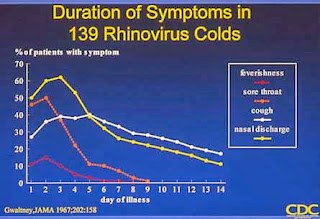The term ‘common cold’ refers to a complex of signs and symptoms sharing similar characteristics but which may be caused by a variety of different viruses. Usually referred as viral upper respiratory tract infections (vURIs), the familiar features of the common cold include runny nose, nasal congestion, sneezing, cough, and sometimes sore throat and watery eyes.
More than 50% of all infections that could be termed ‘common colds’ are caused by rhinoviruses of which there are three species (A, B and C)[1] and 99 known serotypes. Rhinoviruses survive best at the cooler temperatures found in the nose as opposed to the warm depths of the body, which is why the primary signs and symptoms of infection occur there.
The typical cold worsens for the first 3-4 days, plateaus for 1-2 days, and then improves over another 3-4 days. Therefore, most colds have resolved or significantly improved by day 7-10 of the illness. An old proverb perfectly exemplifies the problem: if you suffer from ‘common cold’, it will resolve itself within 7 days if you do nothing and, if you go to your doctor to get some sort of medication, it will last for a week.
Added to the large number of different viruses and virus serotypes that are known, these viruses also mutate rapidly in humans. This makes finding effective treatments and vaccines elusive. Spread of inflection occurs primarily via aerosol droplets (from sneezing and coughing). Thus, the best way to prevent the common cold is to limit transmission. That means frequent hand washing, staying away from others as much as possible when sick, and avoidance of those with colds. But new research also suggests that alcohol-based hand sanitizers antibacterial soaps (usually containing triclosan or triclocarban) do not work to prevent a common cold. The latter is even under close scrutiny by the FDA because they may contribute to bacterial resistance to antibiotics, and may have unanticipated hormonal effects[2].
This all means that if you ‘catch’ a common cold, you know that you do not suffer from Influenza because then you would be really, really ill.
[1] McIntyre et al: Recombination in the evolution of human rhinovirus genomes in Archives of Virology - 2013.
[2] FDA Taking Closer Look at 'Antibacterial' Soap. See here.

No comments:
Post a Comment